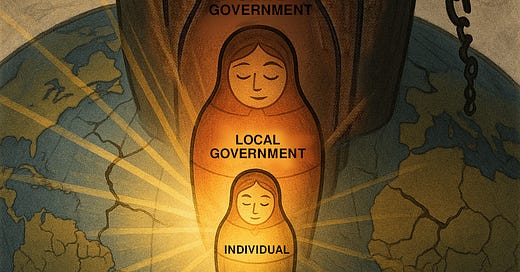Are you a libertarian who wants individual liberty? Then you must oppose globalism. The libertarian ideal of an ungoverned kumbaya global populace where everyone just respects each other's rights and freedoms is as much a fantasy as communist voluntary sharing of labor and wealth. So is the libertarian ideal of being so well armed and trained that you can protect yourself and your interests all on your own. No man is an island. You need to cooperate with others, at the expense of some individual sovereignty, to maximize individual liberty.
While perhaps (using a Pareto distribution by default) 80% of people will naturally cooperate, 20% will seek to take advantage of others. And of those who take advantage, perhaps 80% will do it by subtle grift, fraud, and persuasion while 20% will do it by violence. And you will NEVER change this. It's human nature. It's game theory. Even if you eliminated ALL of the bad actors, the same distribution would evolve again in the vacuum. And if left unchecked, the bad actors will cooperate to oppress the rest.
We have government to protect the cooperative 80% from these anti-social people by disincentivizing uncooperative behaviors, changing the distribution -- establishing a more optimal Nash Equilibrium for protection of individual rights and freedom. In the absence of government, people will form governments, whether tribes, coalitions, cartels, gangs, etc., which will be significantly less ideal than a representative republic. It has to be this way. Anarchy is impossible unless the population is only one.
So the question for libertarians is do you want a completely centralized singular authority at the global level which can oppress everyone, or do you want government closest to the people that is representative of and responsive to the people? If the latter, then you need a hierarchy of governments since very small ones might handle criminal justice but lack the resources to provide for the common defense against large foes, while large ones lack the direct representation available in a smaller community. This is why we have a sovereign federation of sovereign states with a federal government, state governments, and local governments sharing authority in a Nash Equilibrium that maximizes individual liberty. This structure MUST be protected against globalist interests that would dissolve national sovereignty and thereby infringe individual sovereignty.
I'm not a nationalist because I believe in big government, ethnic uniformity, national identity, cultural rigidity, xenophobia, nativism, or any of those typically derogatory characteristics. I'm a nationalist because I believe in self-determination for the individual, which is protected by self-determination of local governance, which is protected by self-determination of state governance, which is protected by self-determination of national governance. That government is best which is most representative of the people by which it's composed, which is the most local. But those local governments must likewise be in a structure of reasonable size to protect each other from anti-social pressures between them. Each higher level of governance should be less powerful in terms of control over individuals, but only be authorized to protect those interests shared by all—i.e. resolving disputes between the level beneath them and protecting against encroachments by the level above them.
A technocratic, oppressive national government is just as bad as a global one besides that you can at least vote with your feet. A global tyranny would be worst of all for there would be nowhere to run and nowhere to hide from it. If there is to be any tyranny, the more local the better, as the means are smaller, the reach is contained, and the options for mitigation significant. If Mao Zedong was only a municipal mayor, he couldn't have genocided tens of millions of people. So the goal must be to minimize power at the most centralized levels—and for life on Earth, that means opposing global government most of all. Ergo, any action which preserves power at the next rung lower, i.e. national governance, over distributing it to any framework of global governance, should be preferred and supported. Likewise, preserving or recovering power to more local levels of governance from the national level, when appropriate, should also be preferred and supported.
In conclusion, true libertarianism—rooted in the protection of individual liberty—cannot coexist with globalism, which inherently centralizes authority beyond the reach of local accountability. While government is necessary to defend against the inevitabilities of human nature and ensure cooperative stability, that government must remain as close to the individual as possible, layered to allow strength in defense but remain restrained in control. National sovereignty serves as a bulwark against global overreach, just as local governance safeguards against national overreach. If liberty is to be preserved, then power must always flow downward toward the individual. Opposing globalism is not an act of fear or xenophobia, but a principled stand for self-determination, subsidiarity, and the preservation of freedom.




